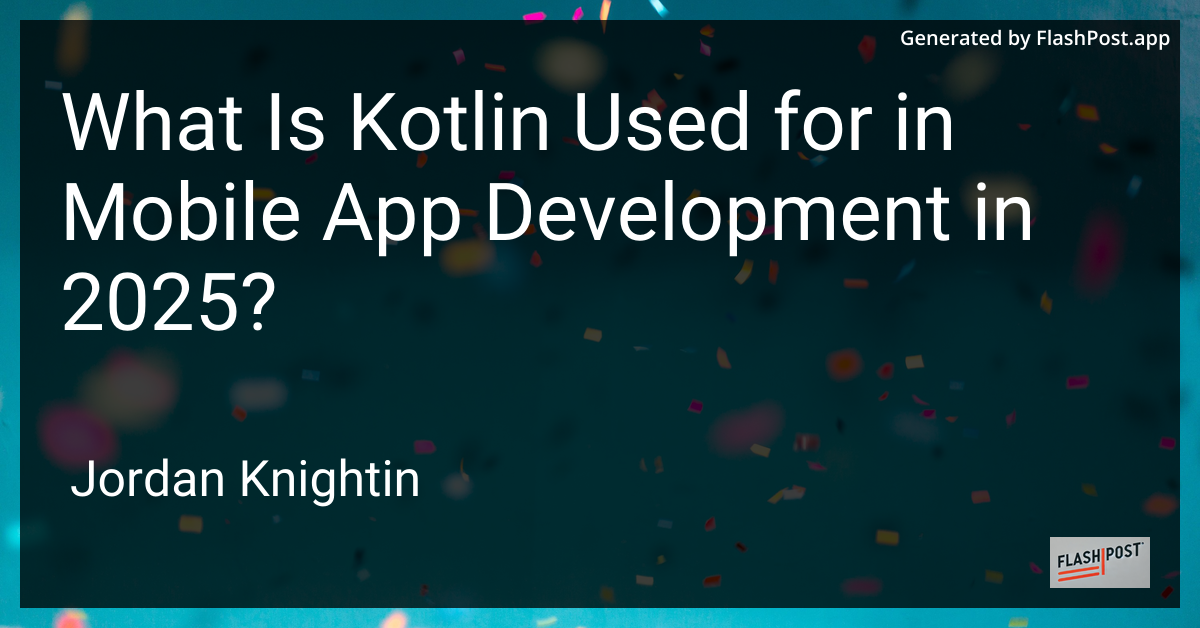

What Is Kotlin Used for in Mobile App Development in 2025?
Kotlin has become the go-to programming language for mobile app development. Since its introduction, its popularity has surged, and by 2025, it remains a staple for developers looking to create robust, scalable, and efficient mobile applications. Here’s why Kotlin continues to play a significant role in mobile app development in 2025, and how developers can leverage this powerful language to enhance their projects.
The Rise of Kotlin in Mobile Development
Originally developed by JetBrains, Kotlin was officially endorsed by Google as a first-class language for Android development in 2017. By 2025, Kotlin is not just preferred but is often considered essential for those developing Android applications due to its many advantages over Java. These include:
- Conciseness: Kotlin’s succinct syntax reduces boilerplate code, enabling developers to write less while achieving more.
- Safety: Its null safety feature helps minimize the occurrence of NullPointerExceptions, a common issue in Java.
- Interoperability: Kotlin can seamlessly integrate with existing Java code, allowing developers to migrate gradually and safely.
Key Uses of Kotlin in 2025
1. Android App Development
Kotlin continues to dominate Android development, offering developers tools to quickly build responsive and modern UX/UI. With Kotlin’s mature ecosystem and sophisticated libraries, app development is more efficient than ever. For instance, developers seeking to automate user interactions can explore techniques such as automating button clicking in Kotlin.
2. Cross-Platform Development
With Kotlin Multiplatform, developers can write code that works on both Android and iOS, thus increasing productivity and ensuring consistent experiences across devices. This approach saves time and resources, making it a popular choice for startups and companies alike.
3. Server-Side Development
Kotlin’s capabilities go beyond mobile development; it’s also useful on the server side. Whether integrating with a backend service or managing data, Kotlin provides a reliable environment for server-side development, offering developers the ability to write everything in one language.
4. Data Serialization and JSON Parsing
Handling data efficiently is critical in app development. Kotlin offers robust libraries for JSON parsing, crucial for apps that rely on external APIs. Developers can implement Kotlin JSON parsing techniques to efficiently access and manipulate data according to their needs.
5. Advanced Data Structures and Algorithms
Developers harness Kotlin’s advanced data structures to build complex applications. Sorting data is a fundamental operation, which can be optimized using Kotlin’s features and techniques. For custom data handling, check out these Kotlin sorting strategies.
The Future of Kotlin in Mobile App Development
As technology evolves, Kotlin continues to adapt, ensuring its relevance in 2025 and beyond. Its ongoing improvements and support for modern development practices make it an ideal choice for developers focusing on sustainability, efficiency, and performance in app development.
Whether you’re a seasoned developer or a newbie entering the realm of mobile applications, Kotlin’s robust set of features and active community support offer a fertile ground for innovation and success.
Conclusion
In 2025, Kotlin remains a cornerstone in mobile app development owing to its versatility, ease of use, and rich feature set. Its extensive capabilities not only simplify the development process but also push the boundaries of what’s possible in mobile computing. Embrace Kotlin to future-proof your mobile applications and deliver cutting-edge experiences to users.
For further reading on Kotlin’s potential and advanced techniques, explore these resources:
